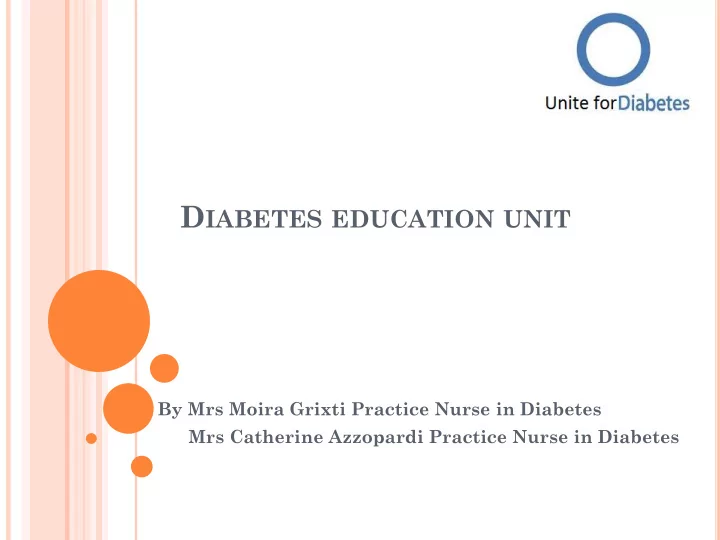

D IABETES EDUCATION UNIT By Mrs Moira Grixti Practice Nurse in Diabetes Mrs Catherine Azzopardi Practice Nurse in Diabetes
R OLE OF A DIABETES NURSE SPECIALIST To establish a holistic and developmental approach to diabetes care in all patients. Assess, plan, support, educate, and evaluate holistic specialist diabetes nursing care in the hospital and home settings.
D UTIES CARRIED OUT AT DIABETES EDUCATION UNIT Individual education sessions to newly diagnosed patients and relatives with type 1 diabetes, patients with type 2 diabetes started on insulin therapy. Mothers diagnosed with gestational diabetes. Education is given both at clinic and ward level. Follow ups. Group education sessions for patients with type 2 diabetes either as lecture form or using conversation map tools for diabetes.
M ETER EXCHANGE Blood glucose meter exchange for all hospitals, health centres, homes for the elderly, MMDNA, prison, school nurses and patients with Type 1 diabetes rounded up to a 1000 patients. Training by following the S.O.P done by the Point of Care Testing Committee on the use of the meter, performing quality control tests and correct technique regarding the uses of the blood glucose meter was given. Audits carried out by the POCT regarding the quality control tests.
D UTIES CARRIED OUT Performing HbA1c test as a point of care test using the HbA1c analyser for the paediatric cases both in Malta and Gozo. Staff training on the management of diabetes. Training for endocrine patients using the Growth Hormone pen. Accompanying Dr John Torpiano and Prof Stephen Fava to Gozo General Hospital for education purposes. Trouble shooting. Organising activities for world Diabetes Day.
C.G.M.S. Performing tests using continuous glucose monitoring system. Every patient is brought to the Diabetes Education Unit 3 times.
D UTIES CARRIED OUT Education material. Drafting of guidelines together with the Insulin Working Group regarding Insulin and Meal Administration. Drafting of guidelines on Insulin injection techniques for syringes and pens. Recommendations on angle of injection according to needles length used. Guidelines on the storage of insulin. Nursing Clinical Guidelines. We help in the organisation and participate in the annual summer camp for children with Type 1 Diabetes.
In the following B REAK DOWN OF E DUCATION SERVICES table one can see Year Individual Lectures HbA1c CGMS Growth the amount of Education Hormone patients seen by Pen us from the year 2007 till today. The number of 2007 197 Patients 76 Patients patient seen have increased and are 2008 320 Patients 65 Patients still increasing. 2009 456 Patients 95 Patients 2010 680 Patients 106 Patients 2011 763 Patients 160 Patients 2012 1355 Patients 120 Patients 69 Patients 90 Patients Started Full time Education. 2013 3245 Patients 80 Patients 298 Patients 70 Patients 38 Patients 2014 till end 1776 Patients 75 Patients 230 Patients 33 Patients 5 Patients of June
R ECOMMENDATIONS Children: According to ‘Royal College of Nursing’ recommendations for nursing services for children with diabetes should be a maximum caseload of 70 children per Diabetes nurse specialist. Adults: According to ‘ Diabetes UK task and Finish Group Report’ recommended minimum core staffing levels for an area with a population of 400 000 average of 10 per cent prevalence of diabetes, is at least 10 Diabetes Specialist Nurses. In total at least 15 Diabetes Nurses are needed.
O BJECTIVES Increasing awareness on diabetes not just organising free blood glucose monitoring more often but lectures targeting the general public by including local councils and media. Awareness and management of children with Type 1 Diabetes in schools (Seminars for Teachers). Organising structured courses with certification for Nurses and Health Care Professionals with an interest in Diabetes Education.
P UMP T HERAPY Initiation of insulin Pump Therapy. Drafting of guidelines and protocols on eligibility of patients to initiate Pump Therapy. Dedicated nurses on just insulin Pump Therapy (set up of a Pump school equipped with a kitchen, to learn proper carbohydrate counting) which will include full time nursing, full time dietician on diabetes only, consultants and psychologists.
IMPLEMENTATION The implementation of the guidelines prioritizing meal and insulin administration and safe practices regarding insulin injection techniques. The scope of the guidelines is that through optimization and standardization of meals and insulin administration times across meals, patients with diabetes mellitus will have better control of blood glucose levels.
C ONCLUSIONS Due to the increase in the services being offered and the increase in newly diagnosed patients with Diabetes both Type 1 and Type 2 and the early initiation of insulin therapy, we need an increase in Human Resources and work space for all of our objectives to be implemented .
Recommend
More recommend